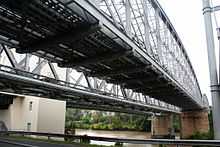Albert Bridge, Brisbane
| Albert Bridge | |
|---|---|
 | |
| Coordinates | 27°30′20″S 152°58′25″E / 27.5056°S 152.9737°ECoordinates: 27°30′20″S 152°58′25″E / 27.5056°S 152.9737°E |
| Carries | Railway |
| Crosses | Brisbane River |
| Locale | Brisbane, Queensland, Australia |
| Official name | Albert Bridge |
| Characteristics | |
| Design | Steel Truss bridge |
| Total length | 208 metres (682 ft) |
| Longest span | two spans each 103.7 metres (340 ft) |
| History | |
| Opened | 1895 |

The Albert Bridge is a heritage-listed railway bridge of steel truss design crossing the Brisbane River, Queensland, Australia. The Albert Bridge links Indooroopilly and Chelmer stations, and has two long spans with one central pier.
The structure consists of two steel spans supported by masonry abutments and a central concrete pier that is encased in an iron caisson.[1] A footway was positioned on the upstream side.
History
The first bridge on the site was completed in July 1875 and enabled the Ipswich to Grandchester railway to reach Brisbane itself.[2] In the early days of settlement, the Brisbane River at Indooroopilly provided an obstacle to the construction of a railway between Brisbane and the mining centre of Ipswich. At this time, a river boat service linked the two centres. The Ipswich railway line did not open until 1875, following the completion of the original Albert Bridge.
The first bridge was destroyed in the 1893 flood, with the present bridge built in 1895.[3] It was designed by Henry Charles Stanley, Queensland's Chief Engineer of Railways from 1891 to 1901.[1] He sought to avoid the obstruction to flood waters posed by multiple piers, which had been the downfall of the first bridge. The bridge was opened to traffic in August 1895 and remains one of Australia's largest truss bridges.[4] Both bridges were named in honour of the Prince of Wales, Prince Albert.
During the second bridge's construction peak a total of 240 workers were involved, both on site and at quarries.[1] When opened the bridge also catered for pedestrian traffic,[5] until the construction of the nearby Walter Taylor Bridge in 1937.[4] A second unnamed railway bridge is located between the Albert Bridge and the Walter Taylor Bridge. This second crossing was constructed in 1957 as part of the quadruplication of the Ipswich railway line.[4]
The Albert Bridge was registered on the (now defunct) Register of the National Estate in 1988 and is listed on the Queensland Heritage Register in 1992.[5]
See also
References
- ↑ 1.0 1.1 1.2 Hogan, Janet (1982). Living History of Brisbane. Spring Hill, Queensland: Boolarang Publications. p. 76. ISBN 0-908175-41-8.
- ↑ "QR Corporate - QR History - Building to the bush". QR Limited. Archived from the original on 22 July 2008. Retrieved 2008-08-16.
- ↑ Longhurst, Robert; William Douglas. The Brisbane River: A pictorial history. Brisbane: W.D. Incorporated Pty Ltd. p. 31. ISBN 0-646-34472-2.
- ↑ 4.0 4.1 4.2 "Indooroopilly Toll Bridge and the Albert Bridge, Brisbane, ca. 1937". State Library of Queensland. Retrieved 2008-09-10.
- ↑ 5.0 5.1 "Albert Bridge (entry 15007)". Queensland Heritage Register. Queensland Heritage Council. Retrieved 2013-05-26.
External links
| Wikimedia Commons has media related to Albert Bridge, Brisbane. |
- Albert Bridge at Structurae
- "Albert Bridge (entry AHD15967)". Australian Heritage Database. Department of Sustainability, Environment, Water, Population and Communities.
- "Albert Bridge (entry 15007)". Queensland Heritage Register. Queensland Heritage Council.